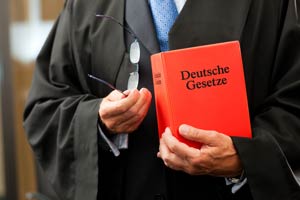Current
informs.
All news at a glance.

We keep you up to date
We bring you the latest developments and news directly to your screen!
Current dates and developments always in view.
Judgment preview for the current year
The Federal Fiscal Court has announced the proceedings in which a ruling is expected to be issued in 2017.
Sometimes it can take years to reach a conclusion in a legal dispute, especially when the highest courts have to rule on the merits. Because many proceedings are of importance not only to the parties involved, the federal courts repeatedly publish a list of the proceedings on which they intend to issue a decision in the coming months.
This helps taxpayers above all in deciding whether it may be worthwhile to keep the tax assessment open in a comparable case by filing an appeal. For entrepreneurs and other taxpayers, the following proceedings mentioned by the Federal Fiscal Court in its decision preview are of particular interest:
-
Developer cases: In many cases, companies and tax offices assumed a reverse charge for construction services provided to developers until 2013. A provision was created to correct these cases, which raises several legal issues, some of which are highly controversial. The Federal Fiscal Court will issue the first supreme court ruling on this.
-
Gifts: Expenses for gifts of more than 35 euros per person cannot be deducted as business expenses. Nevertheless, the recipient must pay tax on the benefit. For this purpose, a flat-rate income tax is possible, which the donor can assume. Whether at least this lump-sum tax is deductible as a business expense is now being clarified.
-
Energy saving lamps: Since 2005, manufacturers have been legally obliged to collect and dispose of electrical and electronic equipment. The Federal Fiscal Court must clarify whether a provision for future expenses for the disposal of energy-saving lamps can be recognized on the basis of this obligation.

-
Company car: The amount of the flat-rate usage value for the private use of a company car is capped at the total costs. The Federal Fiscal Court must clarify whether the exclusion of the 1 % rule for cars held as optional business assets as of 2006 also requires such a cap at 50 % of the actual costs incurred for these cars - particularly in the case of used cars.
-
Commercial income: Trade tax is credited as a lump sum against income tax in order to reduce the double burden on commercial income. However, the credit is limited to the trade tax actually incurred. The Federal Fiscal Court must now clarify whether this limitation is to be determined separately (business-related) or together (entrepreneur-related) for each shareholding in the case of shareholdings in several companies and in the case of multi-level companies. In addition, the Federal Fiscal Court must answer the question of whether the limitation of the tax reduction for commercial income in income tax violates the principle of equality.
-
Shareholder loans: According to the previous case law of the German Federal Fiscal Court (Bundesfinanzhof), the subsequent acquisition costs of an investment also included equity-replacing loans by the shareholder. With the abolition of the right to substitute equity under civil law as a result of the MoMiG with effect from November 1, 2008, the connecting factor under company law for this case law no longer applies. The court must therefore now decide whether and under what conditions losses incurred by a shareholder from a loan granted to the company are to be taken into account for tax purposes in the future.
-
Hidden profit distribution: Payments made by the GmbH to the shareholder or persons close to the shareholder can, at least in certain cases, be regarded simultaneously as a hidden profit distribution and as a gift by the GmbH. The Federal Fiscal Court must now clarify whether the recognition of the hidden profit distribution for corporate income tax and income tax purposes precludes the tax office from additionally assessing gift tax.
-
Detrimental acquisition of shares: The transfer of shares in a corporation can lead to the elimination of tax losses if an acquirer exceeds certain thresholds, whereby a "group of acquirers with similar interests" is deemed to be one acquirer. The Federal Fiscal Court has yet to specify under which conditions such a group is to be assumed.
-
Foreign permanent establishment: If a company incurs losses with a foreign permanent establishment, these losses must primarily be deducted abroad. The judges must now examine whether the limitation on offsetting losses is compatible with EU law.
-
Payroll regulation: In the case of inheritance tax exemption for business assets, the payroll rule does not apply if the business has no more than 20 (old law) or 5 (new law) employees. The Federal Fiscal Court must deal with the determination of the number of employees in the case of subordinate companies and decide whether employees from the period before June 7, 2013, when this was not yet required by law, must also be included.
-
Restructuring: Several proceedings relate to the rule on the non-payment of real estate transfer tax in the event of a restructuring within a group. In particular, the question is whether the tax concession for a spin-off to a newly established company in the group can also be granted if the five-year reservation period was not observed due to the new establishment of the company.
-
Three-object limit: The Federal Fiscal Court must examine whether commercial real estate trading exists if a real estate owner initially offers four of five condominiums through a broker and sells three of them within a few months and gives the fourth apartment to his wife two months later. It is also unclear whether the subsequent sale of this apartment by the wife is to be taken into account.
-
Long-term care allowance: If the heir cared for the decedent free of charge or only for a small fee before the decedent's death, he or she can claim a care allowance of up to 20,000 euros for inheritance tax purposes. The dispute at the Federal Fiscal Court concerns the question of whether and under what conditions this care allowance is due to an heir who was legally obligated to maintain the decedent.

-
Additional caregivers: A taxpayer accommodated in a nursing home additionally employs private caregivers for his care and support. The proceedings concern the question of the amount of the expenses that are reasonable and should be taken into account as an extraordinary burden.
-
Divorce Costs: Since 2013, legal costs are generally excluded from deduction as extraordinary expenses. Only expenses without which the taxpayer would run the risk of losing his livelihood are now taken into account. In several proceedings, the Federal Fiscal Court will decide whether legal costs for a divorce are still deductible even after the new statutory regulation.
-
Artificial insemination: Artificial insemination with an egg donation from a foreign woman is prohibited in Germany. The Federal Fiscal Court (Bundesfinanzhof) must now decide whether the expenses can nevertheless be taken into account as an extraordinary burden if the treatment was carried out in compliance with the law in another EU state that permits the measure.
-
Loss Offset: The court was asked the question of whether losses from capital assets subject to the final withholding tax can be offset against positive capital income subject to the standard income tax.
-
Participation limit: The conditions under which the standard income tax or the final withholding tax applies to interest income from a corporation are the subject of several proceedings. The question is whether indirect shareholdings should also be taken into account when determining the statutory shareholding limit of 10 %, which forces the application of tariff taxation. In addition, it must be clarified whether an indirect shareholding of at least 1 % already opens up an option for taxation according to the tax scale and the associated deduction of actual income-related expenses.
-
Loan default: In a case, the Federal Fiscal Court has to clarify whether the total loss of a private loan receivable due to insolvency of the borrower leads to tax-effective losses after the introduction of the flat rate withholding tax.
-
Goldfinger: In the Goldfinger tax-saving scheme, taxpayers in the UK set up a company and started trading gold on credit. Now there is a dispute as to whether this was a commercial enterprise and whether the acquisition costs for the gold have a tax-reducing effect.
-
Exercise director allowance: Income from a part-time job is tax-free up to 2,400 euros. In the case of higher income, only the portion of the expenses associated with the activity that exceeds the tax-free income may be deducted as operating expenses. In the present proceedings, the Federal Fiscal Court will decide whether the expenses exceeding the tax-free amount are to be allowed as operating expenses if the income falls short of the tax-free amount.
-
Right to a compulsory portion: Other heirs could be affected by proceedings concerning the question of whether a claim to a compulsory portion of the decedent's estate is part of the taxable estate even though the decedent did not assert the claim to a compulsory portion during his lifetime.